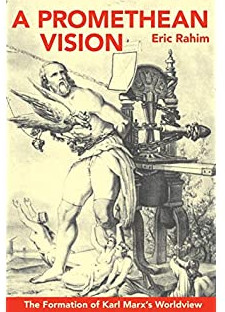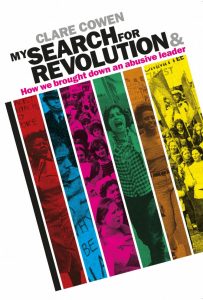Reviews:
Marx’s world view
 A Promethean Vision: The Formation of Karl Marx’s Worldview. By Eric Rahim, Praxis Press, 2020.
A Promethean Vision: The Formation of Karl Marx’s Worldview. By Eric Rahim, Praxis Press, 2020.
In Greek mythology Prometheus defied the gods by stealing fire and giving it to humanity, as a symbol of civilisation. Zeus then punished him by having him tied to a rock with an eagle eating his liver. In the forward to his doctoral dissertation Marx quotes from Aeschylus’ Prometheus Bound where Prometheus tells Hermes, the servant of the gods:
Be sure of this, I would not change my state
Of evil fortune for your servitude.
Better to be the servant of this rock
Than to be faithful boy to Father Zeus.
In this short book Eric Rahim wonders if the 23-year-old Marx was beginning to think of himself as a latter-day Prometheus. At this stage Marx was not yet a communist. Rahim argues that Marx’s communist worldview ‘was fully formulated before he was 30 years old’, and the focus of this study is on the development of his thought up to that point with his writing of the Communist Manifesto in 1848. This is a bold claim. In his defence Rahim cites the economist Joseph Schumpeter who said that, at the age of 29, Marx ‘was in possession of all the essentials’ that make up Marxism.
Rahim is not the first writer to present Marx’s philosophy of history independently of his theory of value, but this creates problems for his conception of Marx’s worldview. For instance, in the Communist Manifesto Marx tells us that the ‘average price of wage-labour is the minimum wage’ required ‘to keep the labourer in bare existence as a labourer’. This is known as the Wage-Fund theory, according to which there is only a fixed pot of capital to pay out as wages, and so wages cannot rise above that amount. Marx only began to develop his own theory of value in the 1850s. In 1865 he gave a talk (published after his death as a pamphlet called Value, Price and Profit) which emphatically rejected the Wage-Fund theory and argued for a class struggle theory of value, according to which wage levels are determined by ‘the respective powers of the combatants’. This is no minor alteration of Marx’s worldview and it makes Rahim’s focus in this book look arbitrary.
Still, this could have joined the long list of ‘What Marx Really Meant’ books if it were not for a section near the end entitled ‘After the Revolution’. At this point Rahim substitutes Lenin for Marx without admitting it or possibly without being aware of it. Rahim asserts that, after the revolution, there is a long transitional phase of communism in which the state is the dictatorship of the proletariat. For Rahim it follows from this that distribution will be governed by ‘the same principles that govern income distribution under capitalism… During this phase we will still have wage labour’. Rahim refers to this as ‘to each according to his work’. His use of quotation marks here suggests that he is quoting Marx.
What Marx really said is that when the working class ‘win the battle of democracy’ (the dictatorship of the proletariat) they will use this political power to establish communism. In the early phase of communism there will be restrictions due to the conditions of the time (1875 when Marx wrote this). With progress these restrictions will fall away in the later phase of communism. It is important to note however that in both phases of communism there is no state, money economy or wages system. ‘To each according to his work’ is a later Leninist fabrication, although Lenin himself, in State and Revolution (1917), used the Biblical injunction: ‘He who does not work shall not eat’.
This point should be seen in conjunction with Lenin’s insistence on the leading role of the vanguard party. This is important because whenever and wherever the Leninist model has been followed it has always ended in a state capitalist dictatorship over the proletariat, and Marx’s worldview gets dragged through the mud.
LEW
 A Siberian Winter in Trottingham
A Siberian Winter in Trottingham
Winter at the Bookshop. Sylvia Riley. Five Leaves. 2019
Essentially a book of short stories and anecdotes, this has been put together by the writer of Switchboard Operators, which years ago was made into the 1990s TV series The Hello Girls starring Letitia Dean.
The bookshop in question was based in the poverty-stricken St Ann’s area of Nottingham and was run by Pat Jordan. Riley was one of the volunteers who helped out. Jordan was one of the leading lights of British Trotskyism, founding the International Group which was for a time the section in Britain of the United Secretariat of the Fourth International. This was the current that was linked to veteran Trotskyist writer Ernest Mandel and to Michel Pablo, who argued that the revolutionary struggle should always take as its starting point the particular situation prevailing in each country concerned. This meant in many cases an emphasis on ‘Third World’ struggles for national liberation and also student revolt, rather than the more usual Trotskyist pre-occupation with the traditional working class.
The International Group – after early dalliances with Ted Grant’s Revolutionary Socialist League (the ‘Militant Tendency’) – eventually morphed into the International Marxist Group and became dominated by Tariq Ali during the student revolts of the late 1960s, which is when the book ends. It is necessarily a highly personal account but generally well written, rather twee on some occasions and moving at others. It tells of a world of backroom duplicators and yellowing pamphlets, of student rebellion and fluid relationships. An air of grinding poverty hangs over it all, in an area long overdue for slum clearance (which happened shortly afterwards).
Nottingham at this time was known nationally as a hotbed of Trotskyist activity in a period when the so-called ‘New Left’ was making its mark as a challenger to the conventional Communist Parties. Pat Jordan and Ken Coates (later to become a Labour MEP) were the most central characters in this milieu and Sylvia Riley writes engagingly about the movement they led, the people in it – and their foibles. Let us say it doesn’t entirely align with the more glamorous image the IMG seemed to have cultivated at the time.
The IMG eventually split and its main successor organisation became ensconced in the Labour Party – with several former IMG members going on to become prominent Labour parliamentary figures, including ex-Chancellor of the Exchequer Alistair Darling and Kate Hoey. A long way indeed from Pat Jordan’s tumbledown bookshop, with its bare light bulbs, Marvel comics and Trotskyist tracts.
DAP
 Sinister Story
Sinister Story
My Search for Revolution & How We Brought Down An Abusive Leader. By Clare Cowen. Matador. 2019. 350 pages. £19.99
Another book of Trotskyist reminiscences from the 1970s and 80s but with a rather more sinister story to tell, that of the ‘Workers Revolutionary Party’ ending in the exposure in 1985 of its leader, Gerry Healy, as a serial sex abuser. The author was one of his victims but most of her book is about the frenetic activity required of its ‘cadres’, the full-time ‘professional revolutionaries’ of which she was one.
At that time the WRP was arguably the premier Trotskyist organisation in Britain. Funded by Vanessa Redgrave and her sinister brother Corin, and also by the author and later Colonel Gaddafi, the WRP acquired a residential school, a number of bookshops, and a modern printing press on which it printed a daily newspaper. At its height it was able to ‘mobilise’ thousands of ‘youth’ and fill large venues such as Alexandra Palace in London for huge rallies.
Cowen’s account of how it functioned internally is disturbing and suggests it was more like a cult than a political party; its cadres had to devote the whole of their life to the organisation and accept a rigid discipline that included sessions at which they could be accused of being in error and forced to recant.
Fortunately a ‘revolution’ led by such a party never happened, nor was likely to despite the WRP motivating its cadres by proclaiming that it (or, alternatively, fascism) was imminent. When, following the defeat of the miners’ strike, most of them realised that it wasn’t, the whole thing fell apart, though a much smaller WRP still exists on the same basis, putting up 5 candidates at the last general election.
ALB
 Fixing the System
Fixing the System
Internationalism or Extinction. By Noam Chomsky Routledge. 2020.
At the age of 91 Noam Chomsky is still writing, speaking and campaigning. This latest book, containing material both spoken and written between 2016-19, has as its theme the idea that society as currently constituted faces imminent extinction from the twin threats of nuclear war and climate change. The remedy he argues is ‘internationalism’, seen as people the world over ‘mobilising to force governments to meets this unprecedented challenge to civilization’s survival’.
His case against the profit system of capitalism is a powerful one. Capitalism is seen as ‘penetrating every part of society with the passions of self-interest and profit and breaking down community and the common good’ and as ‘an intertwined sociopathic system of money-making, militarism and environmental destruction now threatening the survival of all life itself’. To overcome this he calls in this book for a universalised movement of activism and resistance from below to force governments to take a different path and even to bring about ‘world government’ as conceived for example by Albert Einstein in 1945.
The focus therefore is upon people getting together to put pressure on their governments through campaigns of many different kinds since ‘systems of organized power… will not take appropriate action… unless they are compelled to do so by constant, dedicated popular mobilization and activism’. However, while being an advocate of single-issue campaigns, he also shows awareness that this has its limits and, sometimes at least, seems to recognise that the threats to humanity posed by the profit system cannot seriously be addressed until consciousness of the need to change society completely is widespread, with its success depending on ‘the steady hard work of developing consciousness and understanding’. He does not see that happening quickly, however, when, in the US for example, a significant proportion of the population are, in his words, ‘ either culturally traditional or pre-modern’ and, for example, either deny global warming or, even if they accept it, do not accept it is happening through human agency.
Two points are worth making here about the way Chomsky approaches his subject. First, despite the ‘internationalism’ in the book’s title, he puts overly strong emphasis on the US and its problems, almost as though this were the single important issue facing the world. Secondly, despite the book’s references to the need to develop understanding as a means of bringing about a radically changed society, the overall emphasis is on single issues with ‘grassroots’ movements such as Extinction Rebellion and Earth Strike mentioned favourably and the hope expressed that such movements can pursue ‘intersectionality and solidarity’ and can be ‘articulated and intertwined with the struggle against extinction’.
In all this, unfortunately, though there is much talk of the need for enhanced democracy, there is no mention anywhere of the democratic world society of free access without governments, without money and wages, without leaders and led, which, even if it may not be imminent, is the only way to effectively transcend capitalist society. While it is impossible not to admire Chomsky for the lifetime of support he has dedicated to ‘progressive’ causes and for his uncompromising opposition to the status quo, the fact is that capitalism provides an unending procession of immediate issues, and with each one a crop of ‘realists’ who argue that their own pressing problem must be tackled first.
It is true that Chomsky, in his lifelong activism, does at times appear to have seen beyond this. In Manufacturing Consent (1988), for example, he says: ‘Presupposing that there have to be states is like saying, what kind of feudal system should we have that would be the best one? What kind of slavery would be the best kind?’ Even more tantalising was his youthful statement that: ‘A democratic revolution would take place when it is supported by the great mass of the people, when they know what they are doing and they know why they are doing it and they know what they want to see come into existence… A revolution is something that great masses of people have to understand and be personally committed to’. Unfortunately there is none of that here and no indication that Chomsky sees that the causes he espouses, even if successful, would amount to any more than a rearrangement of the capitalist system rather than a new and fundamentally different kind of society to replace that system. In the end, attempts to adjust capitalism according to humane criteria are doomed to failure. Without a clear alternative to capitalism, opposition to the way it works and oppresses leads nowhere.
HOWARD MOSS
